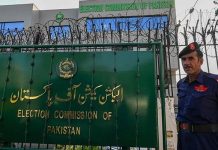DM Monitoring
NEW YORK: A senior Pakistani diplomat has told the UN Security Council that the 6,000-strong Tehrik-e-Taliban Pakistan (TTP), the largest UN-designated terrorist group operating from Afghan soil, posed a direct threat to Pakistan’s national security, state-run APP reported on Tuesday.
“Terrorism emanating from Afghanistan remains a serious threat to its neighbours, particularly Pakistan,” Ambassador Asim Iftikhar Ahmad, permanent representative of Pakistan to the UN, said in an address to the 15-member Council, pointing out that TTP has safe havens close to the Pakistani border.
Speaking in a debate on the situation in Afghanistan, the Pakistani envoy also voiced concern over the potential destabilizing impact of the situation in Iran following unprovoked Israeli attacks.
“A refugee exodus into neighbouring countries—including Afghanistan and Pakistan—could pose significant new challenges,” he said, adding that it might imperil the already fragile conditions in the war-torn country.
Elaborating on the threat to Pakistan, Ambassador Asim Iftikhar said that terrorist entities—including Al-Qaeda, the TTP, and the Baloch militant groups—continue to operate from ungoverned spaces in Afghanistan.
As part of its defensive measures, he said Pakistan has confiscated a significant cache of modern weapons originally left behind by international forces in Afghanistan when they departed after the Taliban captured Kabul four years ago.
In April, he said, 54 TTP terrorists attempting to infiltrate Pakistan were neutralized by the Pakistani security forces, an incident underscoring the scale and seriousness of the threat. “We also have credible evidence of collaboration between the TTP and other groups, such as the BLA and its Majeed Brigade, aimed at disrupting strategic infrastructure and economic development projects in Pakistan,” Ambassador Asim Iftikhar said. Noting that Afghanistan’s internal challenges continue to spill over into the region, he said Pakistan has hosted millions of Afghans for decades. Since August 2021, an additional one million undocumented individuals have crossed into Pakistan, creating among other issues, law-and-order concerns, and called on the international community to share this burden more equitably.
Earlier, Pakistan’s United Nations ambassador on Tuesday raised concerns about the possibility of a “refugee exodus” from Iran into neighboring Pakistan and Afghanistan, as tensions in the Middle East remain high despite the US announcing a ceasefire between Tehran and Israel. Pakistan shares a porous 900-kilometer-long border with Iran in its southwestern region, which is prone to militant violence and illicit activities such as smuggling.
Analysts have warned that a long-term war between Israel and Iran, which began on June 13 after Tel Aviv attacked Iranian nuclear facilities, can lead to a large number of refugees heading toward Pakistan and other neighboring countries. However, hopes of calm returning to the region were spurred on after US President Donald Trump announced early Tuesday that Israel and Iran had agreed to a ceasefire.






